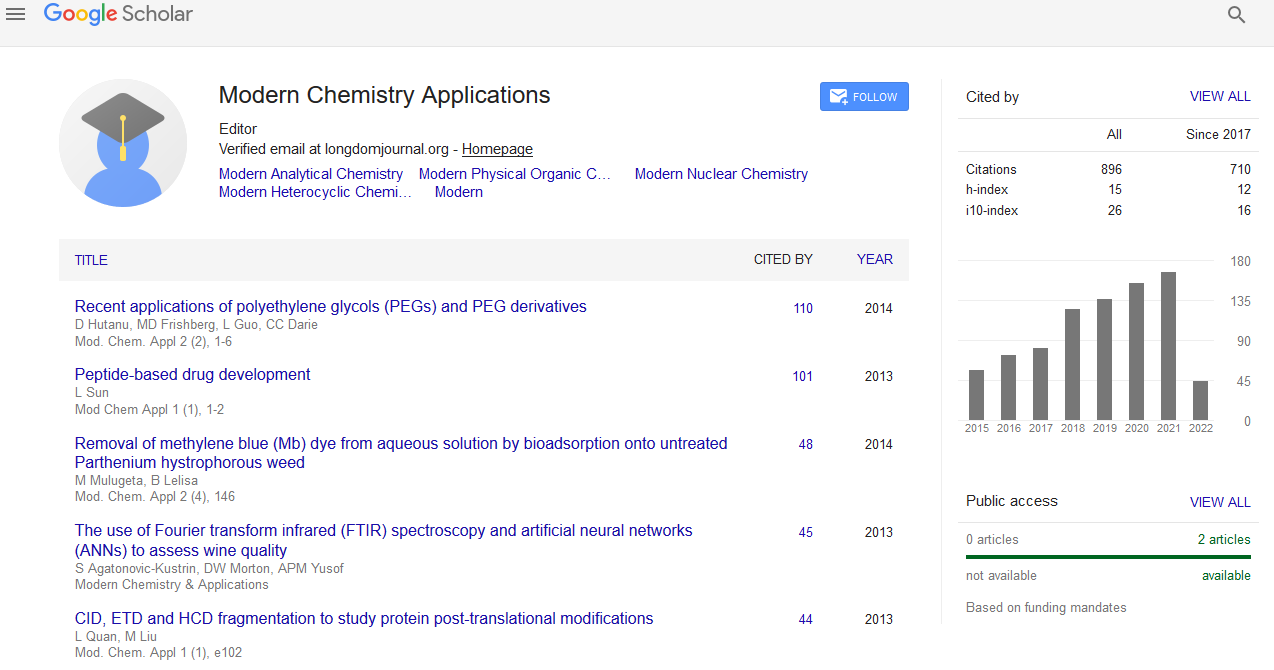Indexed In
- Open J Gate
- JournalTOCs
- RefSeek
- Hamdard University
- EBSCO A-Z
- OCLC- WorldCat
- Scholarsteer
- Publons
- Geneva Foundation for Medical Education and Research
- Google Scholar
Useful Links
Share This Page
Journal Flyer

Open Access Journals
- Agri and Aquaculture
- Biochemistry
- Bioinformatics & Systems Biology
- Business & Management
- Chemistry
- Clinical Sciences
- Engineering
- Food & Nutrition
- General Science
- Genetics & Molecular Biology
- Immunology & Microbiology
- Medical Sciences
- Neuroscience & Psychology
- Nursing & Health Care
- Pharmaceutical Sciences
Work function based sensing of CO2 using amine functionalized Fe3O4@SiO2 core-shell nanoparticles at room temperature
International Conference on Applied Chemistry
October 17-18, 2016 Houston, USA
Nauman Bin Tanvir, Ali Hajian, Ahmadreza Afraz, Olena Yurchenko and Gerald Urban
Albert Ludwigs University of Freiburg, Germany
Bu Ali Sina University, Iran
Posters & Accepted Abstracts: Mod Chem appl
Abstract:
The detection of CO2 with metal oxide (MOX) based semiconducting materials is highly beneficial due to their easy implementation in micro-sensing devices and relatively high cost to performance ratio. Moreover, the amine functionalized nanomaterials enable the prospects towards low energy consuming sensors which can work at room temperature. The mechanism of the change in work function which reflects the adsorption/desorption induced changes is a robust method and can be used to investigate the interaction of CO2 with different sensing materials. In this work we present amine functionalized Fe3O4@SiO2 (Fe3O4@SiO2 NH2) nanoparticles as CO2 gas sensitive material. The nanoparticles were prepared by three-step synthesis method. In the beginning, the hydrothermal synthesis of Fe3O4 nanoparticles was carried out, which was followed by obtaining the Fe3O4@SiO2 core-shell structures by sol-gel method. Finally amine functionalization of the core-shells to yield Fe3O4@SiO2 NH2 nanoparticles was performed. Different techniques such as SEM, TEM and EDS were deployed to characterize the formation of nanoparticles. The surface area of 94.5m2/g was obtained by BET using N2 adsorption-desorption isotherm. For the work function measurements, silicon substrates sputtered with TiN were drop coated with synthesized Fe3O4@SiO2-NH2 nanoparticles. The measurements for the change in work function (√?¬?√?¬¶) for Fe3O4@SiO2 NH2 nanoparticles to varying relative humidity of 0% to 60% suffered a drift but showed a reversible response. Moreover in case of CO2 interaction with Fe3O4@SiO2 NH2 nanoparticles, the change of work function was detected (√?¬?√?¬¶pCO2:400√ʬ?¬?4000 = 19mV). The observed gas sensitivity is of great significance for the development of low cost CO2 gas sensors.
Biography :
Nauman Bin Tanvir is pursuing his PhD at the Chair of Sensors headed by Prof. Urban with Institute for Microsystems Technology (IMTEK) and Freiburg Materials Institute (FMF), University of Freiburg, Germany. He received his Master’s degree in Microsystems Engineering from University of Freiburg, Germany, in 2013 and his Bachelor’s degree in Mechatronics Engineering from National University of Sciences and Technology (NUST), Pakistan, in 2009. His research interests include the structural analysis of semiconducting metal oxide nanoparticles and nano-wires focusing towards work function (Kelvin probe) readout based gas sensing.


